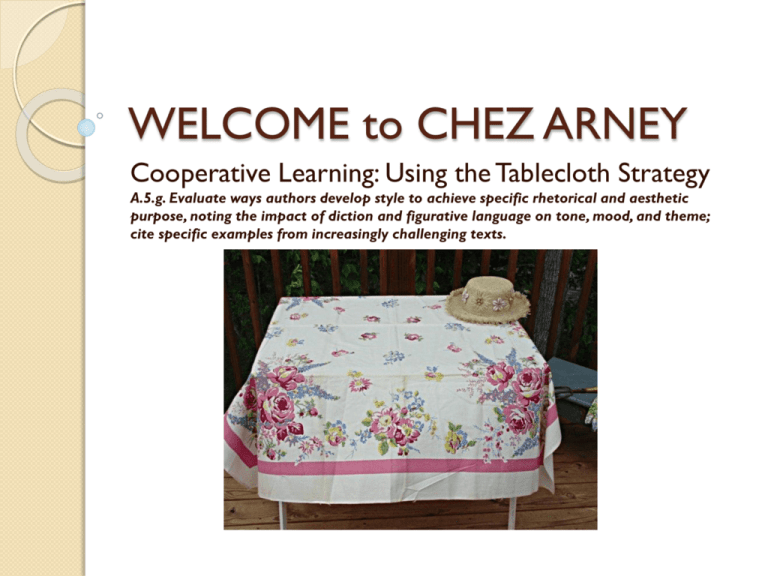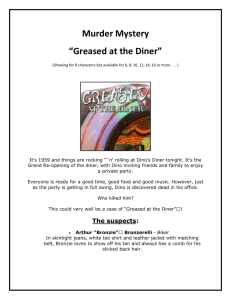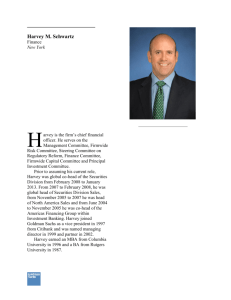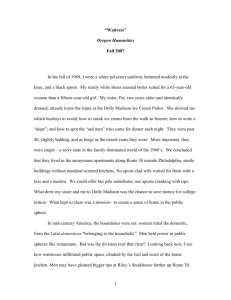Dining Experience--The Sculptor's Funeral
advertisement

WELCOME to CHEZ ARNEY Cooperative Learning: Using the Tablecloth Strategy A.5.g. Evaluate ways authors develop style to achieve specific rhetorical and aesthetic purpose, noting the impact of diction and figurative language on tone, mood, and theme; cite specific examples from increasingly challenging texts. First, please reserve seating for 4! Next, please discuss with your fellow diners the menu provided by your server. The setting can be so integral to the story that it sometimes becomes a character in itself. Characters in these stories adhere to traditional gender, ethnic, and socioeconomic roles. Thematically, many regional and local color stories share an aversion to change and a weakness for sentimentality. Local stories instead incorporate storytelling and revolve around the community and its rituals. Your dining experience will begin after you have asked the server any questions you may have concerning menu items The setting can be so integral to the story that it sometimes becomes a character in itself. Characters in these stories adhere to traditional gender, ethnic, and socioeconomic roles. Thematically, many regional and local color stories share an aversion to change and a weakness for sentimentality. Local stories instead incorporate storytelling and revolve around the community and its rituals. At Chez Arney we encourage diners to share their dining experiences. Please proceed enjoying your dish by explaining to the staff how you know it came from our menu. Leave your comments on the tablecloth. After 6 minutes we ask that you kindly move clockwise around the table to sample another delicacy. As you continue your dining experience… Now you may… Continue to defend the previous patron’s choices Question the previous patron’s comments Challenge the previous patron’s choices. Diner #1 Just then a distant whistle sounded, and there was a shuffling of feet on the platform. A number of lanky boys of all ages appeared as suddenly and slimily as eels wakened by the crack of thunder; some came from the waiting-room, where they had been warming themselves by the red stove, or half asleep on the slat benches; others uncoiled themselves from baggage trucks or slid out of express wagons. Two clambered down from the driver’s seat of a hearse that stood backed up against the siding. They straightened their stooping shoulders and lifted their heads, and a flash of momentary animation kindled their dull eyes at that cold, vibrant scream, the world-wide call for men. It stirred them like the note of a trumpet; just as it had often stirred the man who was coming home to-night, in his boyhood. The night express shot, red as a rocket, from out the eastward marsh lands and wound along the river shore under the long lines of shivering poplars that sentinelled the meadows, the escaping steam hanging in grey masses against the pale sky and blotting out the Milky Way. In a moment the red glare from the headlight streamed up the snow-covered track before the siding and glittered on the wet, black rails. Diner #2 “Take the lid off, Mr. Thompson; let me see my boy’s face,” wailed the elder woman between her sobs. This time Steavens looked fearfully, almost beseechingly into her face, red and swollen under its masses of strong, black, shiny hair. He flushed, dropped his eyes, and then, almost incredulously, looked again. There was a kind of power about her face—a kind of brutal handsomeness, even; but it was scarred and furrowed by violence, and so coloured and coarsened by fiercer passions that grief seemed never to have laid a gentle finger there. The long nose was distended and knobbed at the end, and there were deep lines on either side of it; her heavy, black brows almost met across her forehead, her teeth were large and square, and set far apart—teeth that could tear. She filled the room; the men were obliterated, seemed tossed about like twigs in an angry water, and even Steavens felt himself being drawn into the whirlpool. Diner #3 Feeble steps were heard on the stairs, and an old man, tall and frail, odorous of pipe smoke, with shaggy, unkept grey hair and a dingy beard, tobacco stained about the mouth, entered uncertainly. He went slowly up to the coffin and stood rolling a blue cotton handkerchief between his hands, seeming so pained and embarrassed by his wife’s orgy of grief that he had no consciousness of anything else. “There, there, Annie, dear, don’t take on so,” he quavered timidly, putting out a shaking hand and awkwardly patting her elbow. She turned with a cry, and sank upon his shoulder with such violence that he tottered a little. He did not even glance toward the coffin, but continued to look at her with a dull, frightened, appealing expression, as a spaniel looks at the whip. His sunken cheeks slowly reddened and burned with miserable shame. When his wife rushed from the room, her daughter strode after her with set lips. The servant stole up to the coffin, bent over it for a moment, and then slipped away to the kitchen, leaving Steavens, the lawyer, and the father to themselves. Diner #4 “Harve never could have handled stock none,” interposed the cattleman. “He hadn’t it in him to be sharp. Do you remember when he bought Sander’s mules for eight-year-olds, when everybody in town knew that Sander’s father-in-law give ’em to his wife for a wedding present eighteen years before, an’ they was full-grown mules then?” Every one chuckled, and the Grand Army man rubbed his knees with a spasm of childish delight. “Harve never was much account for anything practical, and he shore was never fond of work,” began the coal and lumber dealer. “I mind the last time he was home; the day he left, when the old man was out to the barn helpin’ his hand hitch up to take Harve to the train, and Cal Moots was patchin’ up the fence, Harve, he come out on the step and sings out, in his ladylike voice: ‘Cal Moots, Cal Moots! please come cord my trunk.’ ” “That’s Harve for you,” approved the Grand Army man gleefully. “I kin hear him howlin’ yet, when he was a big feller in long pants and his mother used to whale him with a rawhide in the barn for lettin’ the cows git foundered in the cornfield when he was drivin’ ’em home from pasture. He killed a cow of mine that-a-way onct—a pure Jersey and the best milker I had, an’ the ole man had to put up for her. Harve, he was watchin’ the sun set acrost the marshes when the anamile got away; he argued that sunset was oncommon fine.” At Chez Arney the server tips the customers, we ask that you leave the server your response. Considering Wyeth’s painting Christina’s World and using at least 2 of your current vocabulary words, take a position on the connection between this painting and Harvey Merricks’ words in Cather’s “The Sculptor’s Funeral.” “…it seems we ought to go back to the place we came from in the end.” Please come back again! Day 2--Thank you for joining us again! Tonight’s experience will include a different menu Speaker Intent Audience Subject At Chez Arney we encourage diners to share their dining experiences. Please proceed enjoying your dish by explaining to the staff why the speaker uses specific rhetorical devices to accomplish his intent. Leave your comments on the tablecloth. After 6 minutes we ask that you kindly move clockwise around the table to sample another delicacy. As you continue your dining experience… Now you may… Continue to defend the previous patron’s choices Question the previous patron’s comments Challenge the previous patron’s choices. Diner #1 “Well, I came back here and became the damned shyster you wanted me to be.You pretend to have some sort of respect for me; and yet you’ll stand up and throw mud at Harvey Merrick, whose soul you couldn’t dirty and whose hands you couldn’t tie. Oh, you’re a discriminating lot of Christians! There have been times when the sight of Harvey’s name in some Eastern paper has made me hang my head like a whipped dog; and, again, times when I liked to think of him off there in the world, away from all this hog-wallow, doing his great work and climbing the big, clean upgrade he’d set for himself. “And we? Now that we’ve fought and lied and sweated and stolen, and hated as only the disappointed strugglers in a bitter, dead little Western town know how to do, what have we got to show for it? Harvey Merrick wouldn’t have given one sunset over your marshes for all you’ve got put together, and you know it. It’s not for me to say why, in the inscrutable wisdom of God, a genius should ever have been called from this place of hatred and bitter waters; but I want this Boston man to know that the drivel he’s been hearing here to-night is the only tribute any truly great man could ever have from such a lot of sick, side-tracked, burnt-dog, landpoor sharks as the here-present financiers of Sand City—upon which town may God have mercy!” Diner #2 The lawyer paused and unfolded his arms, laying one clenched fist quietly on the table. “I’ll tell you why. Because you drummed nothing but money and knavery into their ears from the time they wore knickerbockers; because you carped away at them as you’ve been carping here to-night, holding our friends Phelps and Elder up to them for their models, as our grandfathers held up George Washington and John Adams. But the boys, worse luck, were young, and raw at the business you put them to; and how could they match coppers with such artists as Phelps and Elder? You wanted them to be successful rascals; they were only unsuccessful ones— that’s all the difference. There was only one boy ever raised in this borderland between ruffianism and civilization who didn’t come to grief, and you hated Harvey Merrick more for winning out than you hated all the other boys who got under the wheels. Lord, Lord, how you did hate him! Phelps, here, is fond of saying that he could buy and sell us all out any time he’s a mind to; but he knew Harve wouldn’t have given a tinker’s damn for his bank and all his cattlefarms put together; and a lack of appreciation, that way, goes hard with Phelps. Diner #3 “I’ve been with you gentlemen before,” he began in a dry, even tone, “when you’ve sat by the coffins of boys born and raised in this town; and, if I remember rightly, you were never any too well satisfied when you checked them up. What’s the matter, anyhow? Why is it that reputable young men are as scarce as millionaires in Sand City? It might almost seem to a stranger that there was some way something the matter with your progressive town. Why did Ruben Sayer, the brightest young lawyer you ever turned out, after he had come home from the university as straight as a die, take to drinking and forge a check and shoot himself? Why did Bill Merrit’s son die of the shakes in a saloon in Omaha? Why was Mr. Thomas’s son, here, shot in a gambling-house? Why did young Adams burn his mill to beat the insurance companies and go to the pen?” Diner #4 “Old Nimrod, here, thinks Harve drank too much; and this from such as Nimrod and me! “Brother Elder says Harve was too free with the old man’s money—fell short in filial consideration, maybe. Well, we can all remember the very tone in which brother Elder swore his own father was a liar, in the county court; and we all know that the old man came out of that partnership with his son as bare as a sheared lamb. But maybe I’m getting personal, and I’d better be driving ahead at what I want to say.” The lawyer paused a moment, squared his heavy shoulders, and went on: “Harvey Merrick and I went to school together, back East. We were dead in earnest, and we wanted you all to be proud of us some day. We meant to be great men. Even I, and I haven’t lost my sense of humour, gentlemen, I meant to be a great man. I came back here to practise, and I found you didn’t in the least want me to be a great man.You wanted me to be a shrewd lawyer—oh, yes! Our veteran here wanted me to get him an increase of pension, because he had dyspepsia; Phelps wanted a new county survey that would put the widow Wilson’s little bottom farm inside his south line; Elder wanted to lend money at 5 per cent a month, and get it collected; old Stark here wanted to wheedle old women up in Vermont into investing their annuities in real-estate mortgages that are not worth the paper they are written on. Oh, you needed me hard enough, and you’ll go on needing me; and that’s why I’m not afraid to plug the truth home to you this once. At Chez Arney the server tips the customers, we ask that you leave the server your response. Considering Johnson’s painting The Young Convalescent and using at least 2 of your current vocabulary words, take a position on the connection between this painting and Jim Lairds’ words in Cather’s “The Sculptor’s Funeral.” “…it’s not for me to say why, in the inscrutable wisdom, of God, a genius should have come from this place of hatred and bitter waters…” Please come back again!







